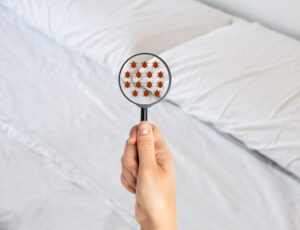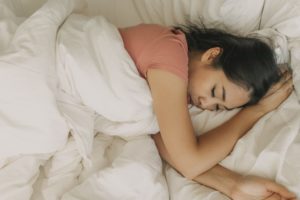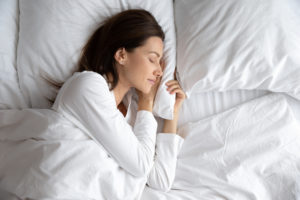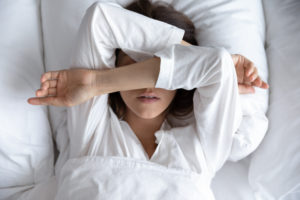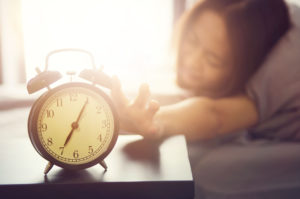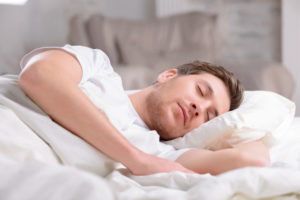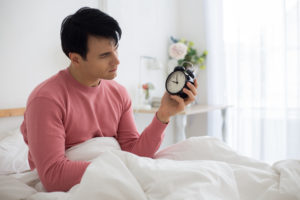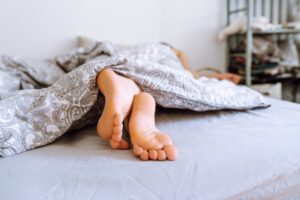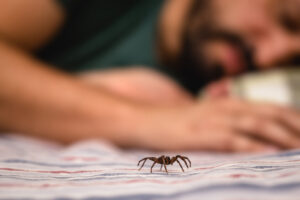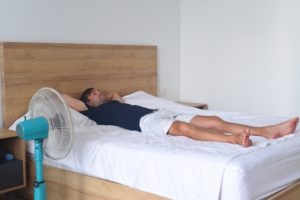Why Is It So Hard to Wake Up?
If you have ever woken up in the morning wanting to hit the snooze button and go straight back to sleep, you are not alone. Waking up feeling groggy and sleepy is natural and can even happen after a full night’s sleep. However, persistent trouble waking up or lingering sleepiness throughout the day might be signs of poor sleep quality or an underlying health issue.
If you want to wake up feeling more refreshed and alert, it can help to learn some of the reasons for morning grogginess and what measures you can take to make mornings easier.
Reasons Why You Can’t Wake Up In The Morning
Having a hard time waking up in the morning may be due to the natural effects of sleep inertia, your sleep habits and schedule, or sometimes point to underlying conditions.
Sleep Inertia
One reason for having trouble waking up is sleep inertia, a brief time when the body transitions from sleep to being awake. Sleep inertia can make a person feel groggy, disoriented, and even cognitively impaired immediately after waking. The effects of sleep inertia usually last around 30 to 60 minutes but may persist for up to several hours.
The cause of sleep inertia is not fully understood, but researchers have observed certain processes in the body that may contribute to the feeling of morning grogginess. Sleep inertia may be influenced by changes in brain activity as a person is waking up, reduced blood flow to the brain, and levels of adenosine, a hormone involved in sleepiness.
While anyone can experience sleep inertia, it is worse in people who have recently lost sleep as well as in people with certain sleep disorders and mental health conditions.
Is Your Troubled Sleep a Health Risk?
A variety of issues can cause problems sleeping. Answer three questions to understand if it’s a concern you should worry about.
Sleep Loss
A simple reason for having difficulty waking up in the morning is that you are not meeting your sleep needs. The American Academy of Sleep Medicine suggests that adults should aim for at least 7 hours of sleep, whereas teens and children need more, but each person is different.
Sleep deprivation can build up over time, which is known as sleep debt. This can only be resolved by getting enough sleep. After making up for lost sleep, you may find yourself waking up feeling less sleep inertia and more refreshed.
Changes to Your Circadian Rhythm
Difficulty waking up can also result from a misalignment between your sleep schedule and your body’s circadian rhythm. Circadian rhythms are internal 24-hour patterns that control the timing of various processes in the body, including the release of hormones and when you feel sleepy and alert throughout the day. There are several reasons why your circadian rhythms could make it harder for you to wake up.
- School schedule: Adolescents experience a natural shift in their circadian rhythms around puberty that make it easier to stay up late and more difficult to wake up early. School schedules often do not account for this shift in circadian rhythms, leaving many adolescents sleep deprived during the week.
- Work schedule: People who work night shifts, swing shifts, or rotating shifts may find it hard to both wake up and fall asleep due to persistent disruptions to their circadian rhythms.
- Jet lag: When traveling across several time zones, the body’s circadian rhythm needs time to adjust. As a result, jet lag can cause a person to feel more sleepy in the morning than usual if they have recently traveled a long distance.

Sleep Disorders
If mornings are difficult enough to interfere with your daytime activities, it might be time to talk to a doctor. Doctors can evaluate your symptoms and medical history, perform an exam, and recommend testing to diagnose or rule out a variety of sleep disorders associated with waking up feeling unrefreshed.
- Circadian rhythm sleep disorders: In circadian rhythm sleep disorders, changes in a person’s circadian rhythm lead to sleep problems that affect their health or ability to perform at work, school, or in other areas of their life.
- Idiopathic hypersomnia: People with idiopathic hypersomnia often find it difficult to wake up after both naps and a full night’s sleep. They may also feel excessively tired during the day and fall asleep unexpectedly.
- Narcolepsy: Narcolepsy is a sleep disorder that can result in poor sleep during the night and cause excessive daytime sleepiness. People with narcolepsy may wake up feeling refreshed but then quickly fall back to sleep .
- Obstructive sleep apnea: Obstructive sleep apnea causes a person’s breathing to pause or become shallow during the night, which leads to reduced sleep quality. As a result, people with sleep apnea may be excessively tired in the morning and find it harder to wake up .
Other Medical Conditions
A wide range of health conditions, including arthritis, back pain, or heart disease, can make it harder to get deep sleep at night, which can result in feeling less refreshed and alert in the morning. In fact, nearly any chronic condition that increases inflammation in the body can make you feel more sleepy. Mental health conditions like anxiety and depression can also make it challenging to wake up early in the morning.
Is It Normal To Have Difficulty Waking Up?
While only a doctor can determine if your difficulty waking up is normal, feeling groggy in the morning can affect anyone and is usually temporary. Studies have found that as many as 42% of adolescents report difficulty waking up, and the likelihood of morning grogginess decreases with age.
How To Wake Yourself Up In The Morning
If you want to dodge groggy feelings in the morning, there are a variety of tips for waking up easier and getting better quality sleep.
- Set a dependable sleep schedule: Going to sleep and getting up at the same time every day is part of good sleep hygiene and can help make it easier to wake up feeling refreshed. Avoid sleeping in on the weekends because the shift in your sleep schedule can make it more difficult to wake up early during the week.
- Let the light in: Daylight helps to regulate circadian rhythms, so getting sunlight first thing in the morning can help your body feel more alert throughout the day. Exposure to bright lights indoors can also be effective if it is not possible to get natural light.
- Wash your face: Research shows that people who wash their face after waking up feel more alert than those who do not, so it might be a good method to help wake yourself up.
- Avoid hitting snooze: Although research on the effects of hitting the snooze button is limited, the results of one study suggest that snoozing an alarm extends sleep inertia , making it harder to eventually wake up.
- Grab a coffee or tea: Caffeine intake first thing in the morning has been found to help overcome the effects of sleep inertia. Caffeine helps wake you up because it blocks adenosine receptors in the brain that make you feel sleepy.
- Eat a healthy breakfast: Eating breakfast is a great way to feel more energetic in the morning. One study found that a breakfast high in carbohydrates can be particularly beneficial for overcoming sleepiness.
- Take a nap: Napping during the day can help improve your alertness and may be helpful if your sleepiness is due to sleep debt. However, it is important not to nap too late in the day because it can disrupt the next night’s sleep.
If lifestyle changes have not made it easier to wake up, a doctor might be able to provide support and medical treatments that could help. For example, strategically taking melatonin might help adjust your circadian rhythm , and certain drugs can help treat diagnosed sleep disorders such as idiopathic hypersomnia. However, it is important to first discuss supplements and medications with your doctor to make sure they are right for you.

Still have questions? Ask our community!
Join our Sleep Care Community — a trusted hub of sleep health professionals, product specialists, and people just like you. Whether you need expert sleep advice for your insomnia or you’re searching for the perfect mattress, we’ve got you covered. Get personalized guidance from the experts who know sleep best.
References
12 Sources
-
Hilditch, C. J., & McHill, A. W. (2019). Sleep inertia: Current insights. Nature and Science of Sleep, 11, 155.
https://pubmed.ncbi.nlm.nih.gov/31692489/ -
Consensus Conference Panel, Watson, N. F., Badr, M. S., Belenky, G., Bliwise, D. L., Buxton, O. M., Buysse, D., Dinges, D. F., Gangwisch, J., Grandner, M. A., Kushida, C., Malhotra, R. K., Martin, J. L., Patel, S. R., Quan, S. F., Tasali, E., Non-Participating Observers, Twery, M., Croft, J. B., Maher, E., … Heald, J. L. (2015). Recommended amount of sleep for a healthy adult: A joint consensus statement of the American Academy of Sleep Medicine and Sleep Research Society. Journal of Clinical Sleep Medicine, 11(6), 591–592.
https://pubmed.ncbi.nlm.nih.gov/25979105/ -
National Center for Chronic Disease Prevention and Health Promotion, Division of Population Health. (2022, October 5). Schools start too early. Centers for Disease Control and Prevention., Retrieved January 23, 2023, from
https://www.cdc.gov/sleep/features/schools-start-too-early.html -
Chervin, R. D. (2022, January 31). Idiopathic hypersomnia. In T. E. Scammell (Ed.). UpToDate., Retrieved January 23, 2023, from
https://www.uptodate.com/contents/idiopathic-hypersomnia -
Schwab, R. J. (2022, May). Narcolepsy. Merck Manual Professional Version., Retrieved January 23, 2023, from
https://www.merckmanuals.com/professional/neurologic-disorders/sleep-and-wakefulness-disorders/narcolepsy -
Schwab, R. J. (2022, September). Approach to the patient with a sleep or wakefulness disorder. Merck Manual Professional Version., Retrieved January 23, 2023, from
https://www.merckmanuals.com/professional/neurologic-disorders/sleep-and-wakefulness-disorders/approach-to-the-patient-with-a-sleep-or-wakefulness-disorder -
Trotti, L. M. (2017). Waking up is the hardest thing I do all day: sleep inertia and sleep drunkenness. Sleep Medicine Reviews, 35, 76-84.
https://pubmed.ncbi.nlm.nih.gov/27692973/ -
Hilditch, C. J., Dorrian, J., & Banks, S. (2016). Time to wake up: Reactive countermeasures to sleep inertia. Industrial Health, 2015-0236.
https://pubmed.ncbi.nlm.nih.gov/27193071/ -
Ogawa, K., Kaizuma-Ueyama, E., & Hayashi, M. (2022). Effects of using a snooze alarm on sleep inertia after morning awakening. Journal of Physiological Anthropology, 41(1), 43.
https://pubmed.ncbi.nlm.nih.gov/36587230/ -
Bordeaux, B. (2022, June 22). Benefits and risks of caffeine and caffeinated beverages. In D. Seres (Ed.). UpToDate., Retrieved January 23, 2023, from
https://www.uptodate.com/contents/benefits-and-risks-of-caffeine-and-caffeinated-beverages -
Vallat, R., Berry, S. E., Tsereteli, N., Capdevila, J., Khatib, H. A., Valdes, A. M., Delahanty L. M., Drew, D.M., Chan, A. T., Wolf, J., Franks, P. W., Spector, T. D., & Walker, M. P. (2022). How people wake up is associated with previous night’s sleep together with physical activity and food intake. Nature Communications, 13(1), 7116.
https://pubmed.ncbi.nlm.nih.gov/36402781/ -
Auger, R. R., (2022, June 3). Delayed sleep-wake phase disorder. In C.A. Goldstein & R. D. Chervin (Ed.). UpToDate., Retrieved January 23, 2023, from
https://www.uptodate.com/contents/delayed-sleep-wake-phase-disorder




